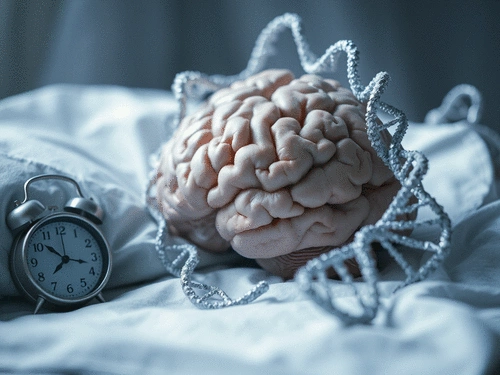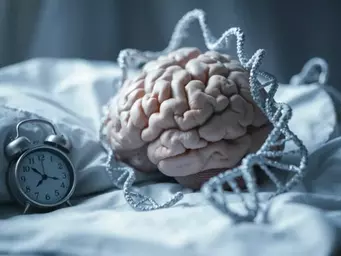Consider this: genetics could be the silent puppeteer behind your sleepless nights. As more research unfolds, we’re learning how our DNA intricately weaves into the fabric of insomnia. Understanding this connection is crucial for anyone seeking a better night's rest.
What You Will Learn
- Insomnia can significantly impact daily functioning and may be influenced by genetic factors.
- The heritability rate of insomnia ranges from 30% to 50%, indicating a genetic predisposition.
- Specific gene variants such as PER3 and DEC2 play roles in sleep architecture and quality.
- Genetic testing can provide insights into individual risk factors and help tailor personalized management strategies for insomnia.
- Future developments in genetics may lead to more targeted, effective treatments for insomnia, enhancing overall sleep health.
The Genetic and Environmental Interplay in Insomnia
This visual illustrates the key factors contributing to insomnia, highlighting the balance between genetic predispositions and environmental influences, and how they define the condition.
Heritability of Insomnia
Research indicates a 30% to 50% heritability rate for insomnia, suggesting a significant genetic component.
30-50%
Genetic Influence
Key Insomnia Symptoms
- Difficulty falling asleep: Prolonged sleep initiation.
- Difficulty staying asleep: Frequent nocturnal awakenings.
- Early morning awakenings: Unable to return to sleep.
Core manifestations of insomnia
Genetic Influences on Sleep
Specific gene variations (e.g., PER3, DEC2) affect sleep duration, quality, and sensitivity to disruptions.
- Sensitivity to sleep disruption
- Response to environmental factors
- Overall sleep quality
Future of Insomnia Treatment
- Advancements in research: Deeper genetic insights.
- Personalized medicine: Tailored treatments based on genetics.
- Innovative therapies: Gene-editing potential.
Towards targeted and effective solutions
Understanding the Genetic Contributions to Insomnia
Have you ever found yourself wondering why some people seem to sleep soundly while others toss and turn? The answer lies in a complex interplay of genetics and environmental factors. Understanding insomnia is crucial, especially when we consider its various definitions and manifestations. In simple terms, insomnia refers to the persistent difficulty in falling asleep, staying asleep, or waking up too early. This condition can lead to significant daytime impairment and distress, affecting both mental and physical health.
Insomnia isn’t just a fleeting issue; it's a genuine health concern that affects millions of individuals globally. As a sleep health advocate with a passion for helping people find answers, I believe that demystifying insomnia is the first step toward managing it effectively!
What is Insomnia and How is it Defined?
Insomnia can be characterized by various symptoms, which can be grouped into three main categories:
- Difficulty falling asleep: Many individuals struggle to initiate sleep, often lying awake for prolonged periods.
- Difficulty staying asleep: Others may wake up frequently throughout the night, disrupting their sleep cycles.
- Early morning awakenings: Some people wake up much earlier than intended and cannot return to sleep.
Each of these symptoms can significantly impair daily functioning, making it essential to address the underlying causes. At Sleep Well Insights, we aim to provide you with the tools and knowledge necessary to tackle these challenges head-on.
The Heritability of Insomnia: What Research Reveals
Research has shown that genetics plays a notable role in the development of insomnia. Studies suggest that insomnia has a heritability rate of around 30% to 50%. This means that individuals with a family history of insomnia are more likely to experience similar issues themselves. A comprehensive review published in Sleep, for instance, highlights the significant genetic component in insomnia susceptibility. Isn’t it fascinating how our genes can influence our sleep patterns?
Understanding this heritability can empower you to take proactive steps in managing insomnia, especially if it runs in your family. By recognizing the genetic predispositions that may exist, you can work towards effective strategies to improve your sleep quality.
How Genetics Influence Sleep Architecture and Quality
The field of sleep research is uncovering various genetic factors that affect our sleep architecture—the structure and pattern of sleep cycles. Specific genes have been linked to the regulation of sleep duration and quality, which can directly influence insomnia symptoms. For instance, variations in genes such as PER3 and DEC2 have been associated with sleep timing and duration, as detailed in research findings available on NCBI Books.
- Sensitivity to sleep disruption: Some individuals may be more genetically predisposed to disruptions in their sleep cycles.
- Response to environmental factors: Genetics can affect how we respond to external stressors, like noise or light, that can impede sleep.
- Overall sleep quality: Genetic variations can impact how rested and refreshed we feel after a night's sleep.
As we continue to explore the genetic landscape of insomnia, it's clear that understanding these factors can lead to tailored approaches to treatment and management. Remember, knowledge is power when it comes to reclaiming your restful nights!
We Want to Hear From You!
As you navigate through the complexities of insomnia, we’d love to know: What has been your biggest challenge in achieving restful sleep? Share your thoughts below:
Summarizing the Intersection of Genetics and Insomnia
As we dive deeper into the world of insomnia, it's clear that genetics play a significant role in our sleep patterns and challenges. Understanding this connection can empower us to take actionable steps toward better sleep. From genetic research to practical guidance, let's unpack what we've learned.
- Genetic predisposition: Research shows that insomnia can run in families, indicating a heritable component.
- Gene variants: Specific gene variants have been linked to sleep regulation, highlighting biological influences on insomnia.
- Environmental interactions: Our lifestyle choices can modify genetic risks, emphasizing the need for a holistic approach.
These key takeaways remind us that while we may have a genetic predisposition to insomnia, our circumstances and choices can influence our sleep health. This understanding opens the door to targeted interventions and better management strategies.
Key Takeaways from Genetic Research on Insomnia
In recent years, the insights from genetic research have revolutionized our understanding of insomnia. Here are some important points to consider:
- Genetics can contribute significantly to the likelihood of experiencing insomnia.
- Identifying specific gene loci helps researchers understand the biological basis behind sleep disturbances.
- Combining genetic data with behavioral and environmental factors offers a more comprehensive view of insomnia management.
These findings can be a beacon of hope for those struggling with sleeplessness. By recognizing the genetic underpinnings of insomnia, we can approach treatment more effectively and tailored to individual needs.
Practical Guidance for Individuals: Considering Genetic Testing
If you're facing insomnia, you might wonder if genetic testing could provide insights into your condition. Here are some practical considerations:
- Understanding your genetic risk: Testing can reveal specific genetic markers related to sleep issues.
- Informed decision-making: With knowledge of your genetic predispositions, you can make personalized lifestyle changes.
- Consultation with professionals: Always consider discussing testing options with a healthcare provider who understands insomnia.
By embracing the potential of genetic testing, you can gain valuable insights that help tailor your approach to achieving restful nights!
Looking Ahead: The Future of Genetics in Insomnia Treatment
As we look to the future, the intersection of genetics and insomnia treatment is promising. There are many exciting developments on the horizon that could dramatically improve the way we address sleeplessness.
- Advancements in research: Ongoing studies are uncovering more about the genetic factors contributing to insomnia.
- Personalized medicine: Treatments may soon be tailored based on an individual's genetic makeup.
- Innovative therapies: Techniques like gene-editing could revolutionize how we approach insomnia management.
Staying informed about these developments will be crucial for anyone seeking effective treatments for insomnia. At Sleep Well Insights, we are committed to sharing the latest information and advancements to help guide your journey toward better sleep.
What to Expect in Research and Clinical Practice
The future of insomnia treatment is bright, with research continuously evolving. Here’s what you can expect:
- Increased focus on genetic studies that provide deeper insights into insomnia.
- More personalized treatment options emerging from genetic findings.
- Integration of behavioral therapies with genetic information for holistic care.
This evolution in understanding and treating insomnia signals hope for many who suffer from it. The more we know, the better we can combat sleeplessness together!
Encouraging Personalized Approaches to Managing Insomnia
As we embrace the future of insomnia treatment, it’s vital to advocate for personalized care. What works for one person might not be effective for another. Here’s how to foster personalized approaches:
- Identify genetic factors and their influence on your sleep.
- Incorporate lifestyle changes that support your unique sleep needs.
- Consult with healthcare providers to develop tailored treatment plans.
By considering your individual circumstances alongside your genetic background, you can create a more effective strategy for managing insomnia and improving your overall sleep quality.
Exploring the Role of Pharmacogenetics in Medication Efficacy
Pharmacogenetics is an emerging field that examines how our genes affect our responses to medications. This is especially relevant for those dealing with insomnia. Here are a few key insights:
- Some individuals may metabolize sleep medications differently due to their genetic makeup.
- Understanding these differences can lead to more effective prescriptions tailored to individuals.
- Research in this area is growing, offering hope for improved medication efficacy for insomnia sufferers. A study published in PubMed provides further insights into how pharmacogenetics can optimize treatment outcomes.
As we explore pharmacogenetics in the realm of insomnia treatment, we may find that effective solutions are just around the corner. At Sleep Well Insights, we’re excited about these developments and how they can help you achieve better sleep!
Frequently Asked Questions About Genetics and Insomnia
- What is the heritability rate of insomnia?
- Research indicates that insomnia has a heritability rate of approximately 30% to 50%, meaning genetics play a significant role in an individual's predisposition to the condition.
- How do specific genes influence sleep?
- Genes like PER3 and DEC2 are known to influence sleep timing, duration, and overall quality. Variations in these genes can make individuals more susceptible to sleep disruptions and insomnia symptoms.
- Can genetic testing help manage insomnia?
- Yes, genetic testing can provide valuable insights into an individual's specific genetic markers related to sleep issues. This information can help tailor personalized lifestyle changes and treatment plans in consultation with healthcare professionals.
- What are the key symptoms of insomnia?
- The main symptoms of insomnia include difficulty falling asleep, difficulty staying asleep (frequent nocturnal awakenings), and early morning awakenings with an inability to return to sleep.
- How will future advancements in genetics impact insomnia treatment?
- Future advancements are expected to lead to more personalized medicine, where treatments are tailored to an individual's genetic makeup. Innovative therapies, including potential gene-editing techniques, may also revolutionize how insomnia is managed.
Recap of Key Points
Here is a quick recap of the important points discussed in the article:
- Understanding Insomnia: Insomnia is characterized by difficulty falling asleep, staying asleep, or waking up too early, impacting daily functioning.
- Genetic Contributions: Genetics account for 30% to 50% of insomnia cases, indicating a heritable component that can influence sleep patterns.
- Gene Variants: Specific genes like PER3 and DEC2 play a role in sleep timing and quality, affecting insomnia symptoms.
- Environmental Interactions: Lifestyle choices can modify genetic risks associated with insomnia, emphasizing a holistic approach to management.
- Personalized Care: Tailored treatment plans considering genetic predispositions, lifestyle, and environmental factors can enhance insomnia management.










